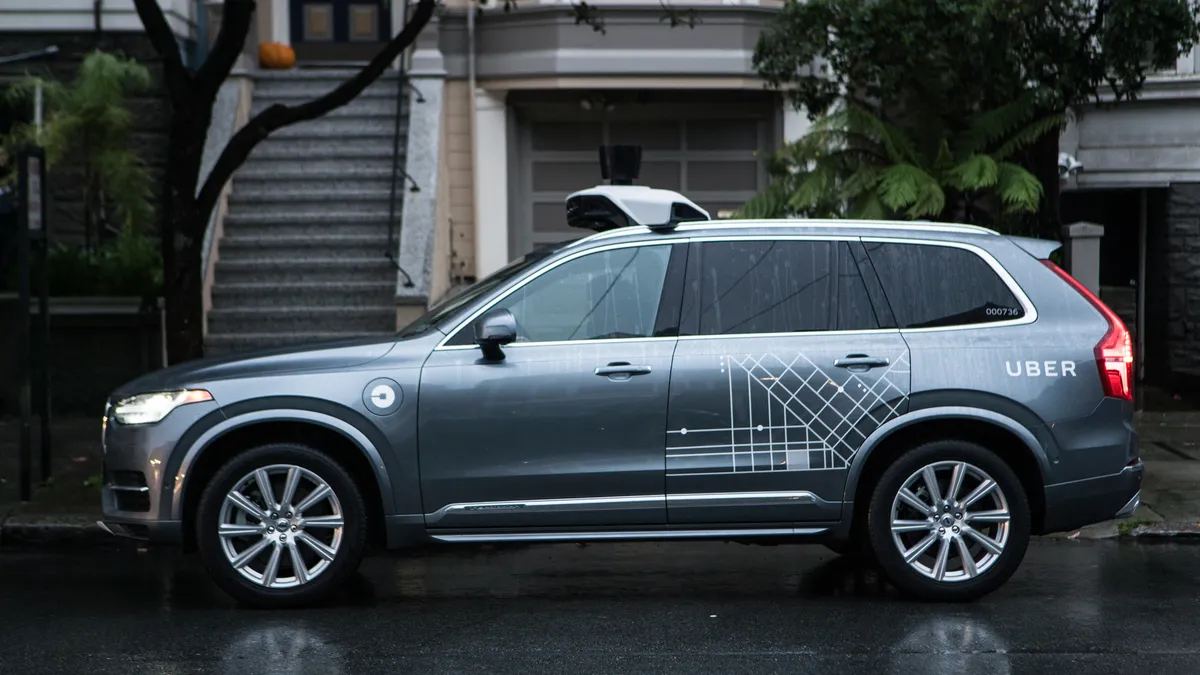UPDATED: May 24, 2018: Uber has shut down its self-driving operations and autonomous vehicle (AV) research in Arizona, according to an internal email obtained by ArsTechnica.
Uber will continue with its AV research in Pittsburgh and San Francisco, but in the email, Uber executive Eric Meyhofer reportedly said the company would change how it does its testing. "When we get back on the road, we intend to drive in a much more limited way to test specific use cases," he said, indicating that tests on public roads would be resumed once proper testing permits have been acquired and safety improvements made.
The Arizona Republic reported that around 200 Uber employees will lose their jobs in Arizona — many of them safety drivers.
Dive Brief:
- Arizona Gov. Doug Ducey sent a letter to Uber CEO Dara Khosrowshahi on Monday saying he would suspend the company's autonomous vehicle (AV) testing across the state indefinitely. This letter is in response to video footage of an accident in which an Uber AV fatally struck a pedestrian in Tempe, AZ.
NEW: In light of the fatal Uber crash in Tempe, Governor Ducey sends this letter to Uber ordering the company to suspend its testing of autonomous vehicles in Arizona indefinitely #12News pic.twitter.com/gO5BZB9P2e
— Bianca Buono (@BiancaBuono) March 27, 2018
- In the video footage, which Ducey called "disturbing and alarming," an Uber safety driver is shown looking away from the road for a long period of time as the vehicle traveled, then looking up and gasping before the video ends. The video also shows a woman, Elaine Herzberg, walking her bike across the dark street just seconds before she was hit.
- Ducey wrote that he expects public safety to be a top priority for AV testing, and "[t]he incident that took place on March 18 is an unquestionable failure to comply with this expectation." It is unclear how long Uber's tests will be suspended, or if any other state will follow suit.
Dive Insight:
This decision to suspend Uber's AV testing indefinitely will have a lasting affect on a number of the company's initiatives in Arizona, particularly in Tempe, where Uber has about 300 employees at the advanced technology group facility, according to Silicon Valley Business Journal. Uber said in a statement that the company will "keep a dialogue open with the governor's office going forward," but this setback will have implications on the entire autonomous vehicle industry.
Since the accident, a number of executives, researchers and journalists have come forward to address the incident, to criticize Uber or to tout how their offerings could have avoided the collision. The New York Times published an investigation on Friday that found Uber's AV testing was "not living up to expectations" months before the accident. Meanwhile, the CEO of Waymo — an Uber rival with a long history of going head-to-head with the company — claimed on Saturday that his company's AVs would have avoided the accident. He noted, "we have a lot of confidence that our technology would be robust and would be able to handle situations like that."
Uber, with an already-tarnished reputation leading up to the accident, is facing a long road to redemption. Michael Ramsey, automotive analyst at Gartner, told The New York Times that an image makeover will be challenging in the wake of this event. "Every other company would get a black eye, too, but they might be forgiven," he said. "For Uber, it's going to be hard to shake."












